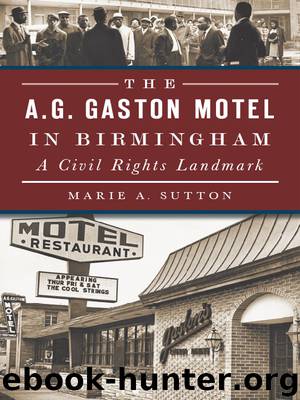The A.G. Gaston Motel in Birmingham: A Civil Rights Landmark (American Heritage) by Sutton Marie A

Author:Sutton, Marie A. [Sutton, Marie A.]
Language: eng
Format: epub
Publisher: Arcadia Publishing Inc.
Published: 2014-11-04T05:00:00+00:00
“The Gaston Motel was Birmingham’s only acceptable black inn, the place where black business and professional people stayed when they visited the city,” Abernathy wrote. 83 King entered the motel and approached Gibson about taking over the place.
“Martin came in with a group—Wyatt Tee Walker, Andy Young, Abernathy and Shuttlesworth,” Gibson remembered. “They all came in and met with me in reference to the fact that they would like to take over all of the rooms and did I have any problem with it.
“I said that I did not, but I could not give them all of the rooms. I am a member of the motel association, and I have to have a portion of the facilities available. They went along with it. Immediately, Dr. King took over the main suite.”
It was fate, the men thought. “Dr. King was so pleased that I was at the motel,” said Gibson. King said it was meant to be, that “God sent you here,” Gibson remembered.
Gibson’s friendship with King was born back in Gibson’s Tuskegee University days. They met in Tuskegee right after King got his doctorate in Boston and was taking over the Dexter Avenue Baptist Church in Montgomery. At the time, Gibson was active with the Tuskegee Civic Association, an organization that was very involved in civil rights in Macon County. Gibson and the group regularly fought for the right to vote, to get public accommodations and to “get things that we as citizens should have bestowed upon us.”
Senator Sam Engelhardt of Macon County was a state legislator at the time and did not like that movement, Gibson said. “He tried to gerrymander us out of Macon County,” Gibson remembered. “We fought him as the civic organization. We took it to the Supreme Court and won.”
When King, who was just miles up the road in Montgomery, heard about the courageous group, he and fellow minister Ralph Abernathy came to Tuskegee to study the movement. Gibson was impressed with young King, he said. “He was so dynamic and articulate,” Gibson said. “Then he was an Alpha.”
Gibson, who was an Episcopalian, decided instead to attend King’s Baptist church. The two became friends, he said. Gibson supported King in Montgomery during the bus boycott.
“When I accepted the position to buy the motel, I did not accept on the premise that Martin would come in with the movement,” Gibson said. Even though it has been said that the motel was retrofitted for the movement, that is not true, according to Gibson. “Gaston didn’t want the movement there at all,” he said. “Mr. Gaston was not in favor of Dr. King coming to Birmingham.”
And he wasn’t alone. Many people saw King and the others as outsiders coming to agitate an already sensitive situation. There was a line drawn in the sand between King and Shuttlesworth supporters versus Gaston’s. According to historian Glenn Eskew, Emory O. Jackson, the editor of Birmingham World , the black weekly newspaper, supported Gaston’s side. “He said little about Shuttlesworth and King as attested by the lack of coverage in the World ,” Eskew wrote.
Download
This site does not store any files on its server. We only index and link to content provided by other sites. Please contact the content providers to delete copyright contents if any and email us, we'll remove relevant links or contents immediately.
| Africa | Americas |
| Arctic & Antarctica | Asia |
| Australia & Oceania | Europe |
| Middle East | Russia |
| United States | World |
| Ancient Civilizations | Military |
| Historical Study & Educational Resources |
Cat's cradle by Kurt Vonnegut(15338)
Pimp by Iceberg Slim(14488)
4 3 2 1: A Novel by Paul Auster(12375)
Underground: A Human History of the Worlds Beneath Our Feet by Will Hunt(12090)
The Radium Girls by Kate Moore(12018)
Wiseguy by Nicholas Pileggi(5770)
The Fire Next Time by James Baldwin(5431)
Perfect Rhythm by Jae(5398)
American History Stories, Volume III (Yesterday's Classics) by Pratt Mara L(5301)
Paper Towns by Green John(5179)
Pale Blue Dot by Carl Sagan(4996)
A Higher Loyalty: Truth, Lies, and Leadership by James Comey(4954)
The Mayflower and the Pilgrims' New World by Nathaniel Philbrick(4495)
The Doomsday Machine by Daniel Ellsberg(4484)
Killers of the Flower Moon: The Osage Murders and the Birth of the FBI by David Grann(4435)
The Sympathizer by Viet Thanh Nguyen(4385)
Too Much and Not the Mood by Durga Chew-Bose(4338)
The Borden Murders by Sarah Miller(4313)
Sticky Fingers by Joe Hagan(4188)
